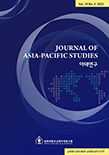한국의 민주주의 공고화, 어떻게, 언제 가능한가?
Consolidation of Democracy in South Korea: How and when can it be possible?
- 경희대학교 국제지역연구원
- 아태연구
- 제15권 제1호
-
2008.0591 - 103 (13 pages)
- 65

한국의 민주주의 공고화가 어떻게 달성이 되는가. 필자는 한국의 정치발전의 목표 모델을 설정해보았으며 이 글의 요약은 다음과 같다. 한국이 선진국가로 가기 위한 정치발전의 목표는 (1)안정, (2)평등, (3)민주주의 라고 했다. 정치발전과정의 개념은 안정과 평등의 요청, 그리고 민주주의 간의 계속적 상호작용을 의미하며 민주주의는 안정과 평등의 문제를 해결할 수 있는 능력이 있어야 한다. 이 세 가지 차원의 상호작용이 발전 증후군을 구성한다고 했다. 이 모델에서는 안정과 평등, 민주주의 간에는 상호의존 관계가 성립한다. 안정은 사회적 동질성과 정치적 합의가 가능 할 때 이루어지며, 국민들의 일체감이 형성 된다. 국민들의 일체감이 형성되기 위해서는 평등의 문제와 연결 되는 것이다. 평등은 정치체제의 목표를 추구하기 위한 무한한 인간 에너지와 재능을 발휘하도록 한다. 그리고 정치체제에 의한 사회적 침투를 촉진한다. 또 시민의식을 통해 일체감과 시민적 의무와 통합을 발전시킬 수 있게 한다. 안정과 평등의 실현 없이는 민주주의가 발전하기가 어렵다는 것을 주장했으며 한국 정치모델에 가설을 제시하고 분석을 했다.
The aim of this paper is to suggest a model for the consolidation of democracy in South Korea. Under this goal, this paper explores three political values - stability, equality, and democracy. As independent variables, stability and equality should be respected. The dynamics of transaction between these two variables and democracy are also required. During this transaction, the democratic system might have the capability to resolve the problems of inequality in the economic, political, and social spheres. The democratic transaction that is often ignored makes possible the realizations of consolidating democracy -where the rights of the individual are the most central aspect. As a Korean value, distributive justice could be a decisive factor that impacts national identity, consciousness of civil duty, as well as public spiritedness. In this article, it is asserted that the consolidation of democracy in South Korea is quite vulnerable to such variables as stability, and distributive justice.
Ⅰ. 서문
Ⅱ. 발전증후군:안정․평등․민주주의
Ⅲ. 정치발전의 목표
Ⅳ. 정치발전의 조정정책
Ⅴ. 결론
참고문헌
(0)
(0)